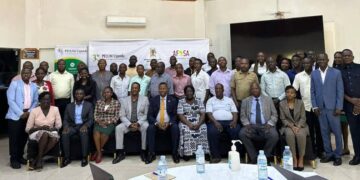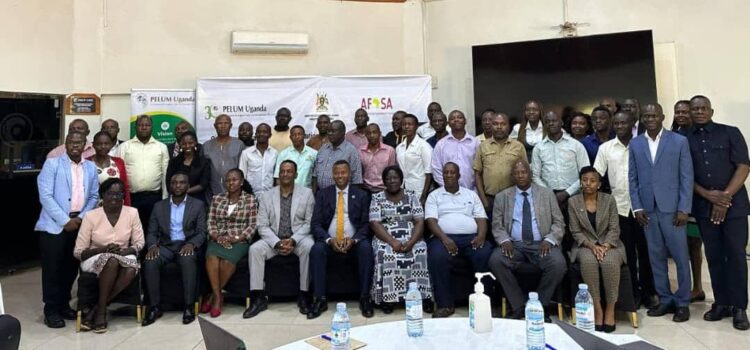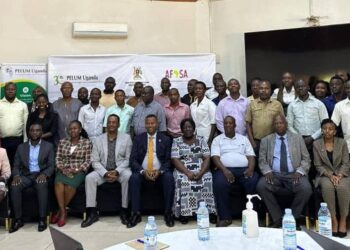By Leonard Kamugisha Akida,
KAMPALA
Civil Society Organizations and stakeholders from across Uganda’s food and nutrition have called for policies that support agroecology, indigenous food preservation, and waste minimization in the food system.
The calls were made during a consultation meeting on the Food and Nutrition Policy (UFNP) 2003 under review organized by the Ministry of Agriculture, Animal Industry and Fisheries (MAAIF) in collaboration with PELUM Uganda at Fairway Hotel, Kampala on Monday.
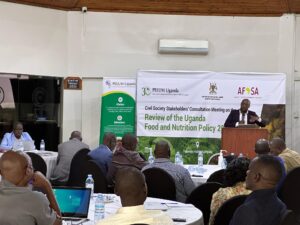
Despite Uganda’s rich agroecological potential, the stakeholders contend that the country continues to face significant food and nutrition challenges such as acute hunger, surge in non-communicable diseases due to unhealthy dietary habits. Other persistent challenges include climate variability, low agricultural productivity, and socioeconomic
barriers which according to the World Bank (2021) continue to impede progress in Uganda.
With close to 10 million people experiencing food insecurity and 2.3 million facing acute food shortages, the meeting highlighted the urgency of overhauling the existing policy to better respond to these realities.
“The revised policy must reflect the voices of smallholder farmers, women, youth, and SMEs,” said a representative from PELUM Uganda. “These are the pillars of our food system, and they need a policy that supports agroecology, indigenous food preservation, and waste minimization.”

The meeting also critically emphasized the need for the integration of zero-waste practices, agrifood SMEs and preservation of culturally appropriate indigenous foods like sorghum, oyster nuts and bitter yams to promote food security, improve dietary habits and reduce post-harvest losses.
Civil society actors stressed the importance of turning food waste into value through composting, bioconversion, and other circular economy solutions to support not only environmental sustainability but also economic resilience.
“By implementing strategies such as
composting, bio-conversion, and innovative recycling technologies, bio-wastes can be transformed into fertilizers, animal feed, and even new food products, thus closing the loop in
the food system and aiding sustainable solutions for waste valorisation. This transition not only addresses environmental concerns by reducing landfill waste and greenhouse gas emissions but also contributes to economic sustainability by creating new opportunities within the food
production and waste management sectors. Ultimately, transforming food waste into a resource aligns with the broader goals of a circular economy, ensuring a sustainable, resilient, and foodsecure future,” a joint stakeholders’ statement read in parts.

During the meeting, MAAIF official, Commissioner Alex Bambona – Principal Agriculture Officer and Head Nutrition and Home Economics disclosed that the Policy is undergoing a review and
has already passed through approval stages.
“The policy has passed through approval stages and it’s coherent with food system game changers. We need to harmonize the food systems upto the national level as at national levels, we need implementation plans when the policy is launched,” said Commissioner Bambona.
“The policy aims to support the private sector, indigenous people, farmers, traders, exporters. Therefore there is need for an optimal solution which we have to all work together to achieve,” he added
In Uganda, 4 out of 10 people cannot meet their dietary needs due to food insecurity and limited access to diverse food options. Diet-related diseases such as stunting, anemia, and obesity have been linked to poor nutrition. Food and Nutrition experts are optimistic that the revised policy would serve not only as a strategic framework but also as a beacon for sustainable and equitable food systems in Uganda.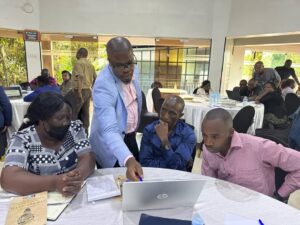
Nonetheless, MAAIF officials assured attendees that the revised UFNP will prioritize inclusivity, sustainability, and health. The updated policy aims to better regulate food safety across the supply chain, protect consumers and agricultural workers, and align with national health goals as Uganda continues to battle a surge in non-communicable diseases linked to poor diet.
Insights gathered from today’s meeting will inform the next draft of the policy, with further consultations expected before final adoption.
